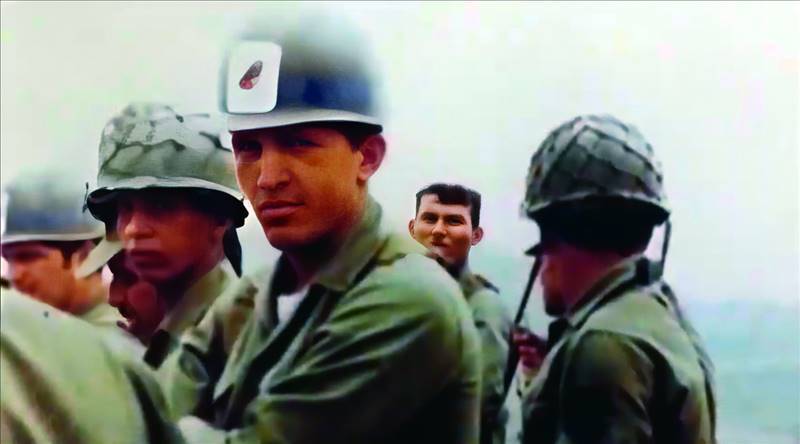
This photograph shows Hugo Chavez as an officer in the Venezuelan military. Chavez was a Venezuelan politician and president of the country from 1999 until his death in 2013.
Born into a middle class family, Chavez became a career military officer and, after becoming dissatisfied with the Venezuelan political system, founded the clandestine Revolutionary Bolivarian Movement-200 (MBR-200) in the early 1980s. Chavez led the MBR-200 in an unsuccessful coup d’état against the Democratic Action government of President Carlos Andrés Pérez in 1992, for which he was imprisoned. Pardoned from prison after two years, he founded a political party known as the Fifth Republic Movement and was elected president of Venezuela in 1998. He was re-elected in 2000 and again in 2006. After winning his fourth term as president in the October 2012 presidential election, he was to be sworn in on January 10, 2013. However, the inauguration was postponed due to his cancer treatment, and he died in Caracas on March 5, 2013 at the age of 58.
Following the adoption of a new constitution in 1999, Chavez focused on enacting social reforms as part of the Bolivarian Revolution. Using record-high oil revenues of the 2000s, his government nationalized key industries, created participatory democratic communal councils and implemented social programs known as the Bolivarian missions to expand access to food, housing, healthcare and education. The high oil profits coinciding with the start of Chavez’s presidency resulted in improvements in areas such as poverty, literacy, income equality and quality of life between primarily 2003 and 2007, though extensive changes in structural inequalities did not occur. On June 2, 2010, Chavez declared an “economic war” on Venezuela’s upper classes due to shortages. By the end of Chavez’s presidency in the early 2010s, economic actions performed by his government during the preceding decade, such as deficit spending and price controls proved to be unsustainable, with Venezuela’s economy faltering. At the same time, poverty, inflation and shortages increased.
Internationally, Chavez aligned himself with the Marxist–Leninist governments of Fidel and then Raúl Castro in Cuba, as well as the socialist governments of Evo Morales in Bolivia, Rafael Correa in Ecuador and Daniel Ortega in Nicaragua. His presidency was seen as a part of the socialist “pink tide” sweeping Latin America. Chavez described his policies as anti-imperialist, being a prominent adversary of the United States foreign policy as well as a vocal critic of U.S.-supported neoliberalism and laissez-faire capitalism. He described himself as a Marxist. He supported Latin American and Caribbean cooperation and was instrumental in setting up the pan-regional Union of South American Nations, the Community of Latin American and Caribbean States, the Bolivarian Alliance for the Americas, the Bank of the South and the regional television network TeleSUR. Chavez’s ideas, programs, and style form the basis of “Chavismo,” a political ideology closely associated with Bolivarianism and socialism of the 21st century.
Born into a middle class family, Chavez became a career military officer and, after becoming dissatisfied with the Venezuelan political system, founded the clandestine Revolutionary Bolivarian Movement-200 (MBR-200) in the early 1980s. Chavez led the MBR-200 in an unsuccessful coup d’état against the Democratic Action government of President Carlos Andrés Pérez in 1992, for which he was imprisoned. Pardoned from prison after two years, he founded a political party known as the Fifth Republic Movement and was elected president of Venezuela in 1998. He was re-elected in 2000 and again in 2006. After winning his fourth term as president in the October 2012 presidential election, he was to be sworn in on January 10, 2013. However, the inauguration was postponed due to his cancer treatment, and he died in Caracas on March 5, 2013 at the age of 58.
Following the adoption of a new constitution in 1999, Chavez focused on enacting social reforms as part of the Bolivarian Revolution. Using record-high oil revenues of the 2000s, his government nationalized key industries, created participatory democratic communal councils and implemented social programs known as the Bolivarian missions to expand access to food, housing, healthcare and education. The high oil profits coinciding with the start of Chavez’s presidency resulted in improvements in areas such as poverty, literacy, income equality and quality of life between primarily 2003 and 2007, though extensive changes in structural inequalities did not occur. On June 2, 2010, Chavez declared an “economic war” on Venezuela’s upper classes due to shortages. By the end of Chavez’s presidency in the early 2010s, economic actions performed by his government during the preceding decade, such as deficit spending and price controls proved to be unsustainable, with Venezuela’s economy faltering. At the same time, poverty, inflation and shortages increased.
Internationally, Chavez aligned himself with the Marxist–Leninist governments of Fidel and then Raúl Castro in Cuba, as well as the socialist governments of Evo Morales in Bolivia, Rafael Correa in Ecuador and Daniel Ortega in Nicaragua. His presidency was seen as a part of the socialist “pink tide” sweeping Latin America. Chavez described his policies as anti-imperialist, being a prominent adversary of the United States foreign policy as well as a vocal critic of U.S.-supported neoliberalism and laissez-faire capitalism. He described himself as a Marxist. He supported Latin American and Caribbean cooperation and was instrumental in setting up the pan-regional Union of South American Nations, the Community of Latin American and Caribbean States, the Bolivarian Alliance for the Americas, the Bank of the South and the regional television network TeleSUR. Chavez’s ideas, programs, and style form the basis of “Chavismo,” a political ideology closely associated with Bolivarianism and socialism of the 21st century.

